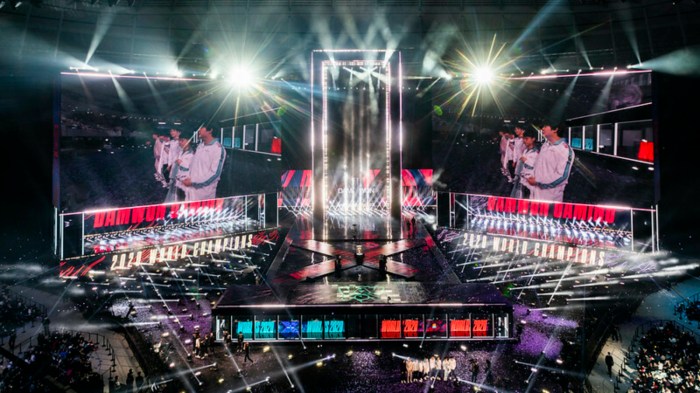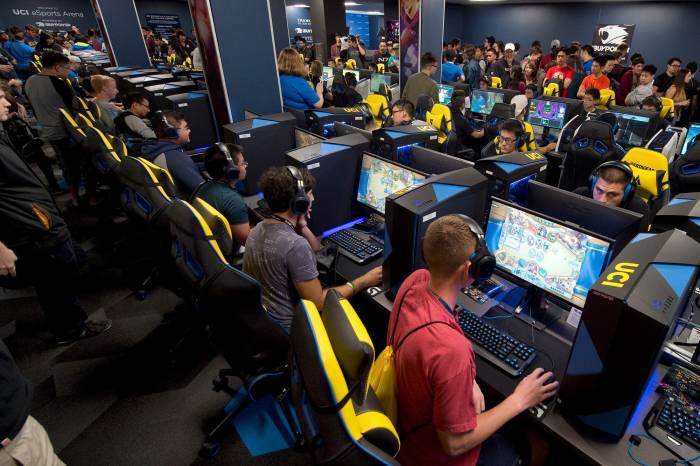
What is esports sets the stage for this enthralling narrative, offering readers a glimpse into a story that is rich in detail and brimming with originality from the outset. Esports, essentially competitive video gaming, has transformed from a niche hobby into a global phenomenon, captivating millions and shaping the gaming landscape with its unique blend of skill, strategy, and community engagement.
The rise of esports has not only redefined how we perceive gaming but has also carved out significant cultural and economic spaces within the entertainment industry. With a rich history that tracks back to early competitions, esports encompasses a variety of game genres, from first-person shooters to strategy games, each with its own passionate following and competitive scene.
Definition and Overview of Esports
Esports, short for electronic sports, refers to competitive video gaming at a professional level. It has become a significant segment of the gaming industry, attracting millions of players and viewers worldwide. The rise of esports has transformed how games are played and perceived, giving birth to a unique culture around competitive gaming.The history of esports can be traced back to the early 1970s with simple games played in competitions.
However, it gained substantial momentum in the late 1990s and early 2000s with the advent of the internet and multiplayer gaming. Titles like “StarCraft” and “Counter-Strike” laid the groundwork for what we now recognize as organized competitive play. Over the years, esports has evolved into a multi-million dollar industry, with professional players, teams, and massive tournaments.The main types of esports games can be categorized into various genres including:
- First-person shooters (FPS) such as “Counter-Strike: Global Offensive” and “Call of Duty.”
- Real-time strategy (RTS) games like “StarCraft II” and “Warcraft III.”
- Multiplayer online battle arena (MOBA) games, notably “League of Legends” and “Dota 2.”
- Sports simulation games including “FIFA” and “NBA 2K.”
Popular Online Games Related to Esports
Several online games are recognized as esports titles, each contributing to the competitive landscape. Games like “Overwatch,” “Fortnite,” and “Valorant” have captivated audiences with their engaging gameplay and potential for competitive play. These titles differ from casual online games due to their structured competition, rigorous skill requirements, and professional leagues.The competitive nature of these games fosters a robust community around them, with players engaging in forums, streaming on platforms like Twitch, and participating in tournaments.
This community aspect enhances the overall experience, making esports not just about the games themselves but the relationships and rivalries that develop.
The Role of Online Games in Esports

Online gaming platforms play a crucial role in facilitating esports competitions. They provide the necessary infrastructure for players to compete globally, enabling tournaments to be held online. These platforms also support player training, allowing individuals to practice and improve their skills through ranked matches and online coaching.Online games contribute significantly to player skill development by offering various modes and challenges that encourage strategic thinking and teamwork.
Multiplayer features are especially vital, as they allow players to work together or against each other, mirroring the dynamics of traditional sports.
Esports Tournaments and Events
Major esports tournaments have become hallmark events in the gaming calendar. These tournaments often feature a variety of formats, including single-elimination, double-elimination, and round-robin stages. Some of the most significant annual esports events include:
- The International (Dota 2)
- League of Legends World Championship
- CS:GO Major Championships
- Overwatch League Grand Finals
Sponsors and partnerships play a vital role in the success of these tournaments, providing the necessary funding and resources that elevate the event’s prestige. Companies in the gaming and tech industries often collaborate with tournament organizers to enhance viewer experiences through improved production quality and innovative engagement strategies.
Online Games for Different Audiences
The esports scene is not limited to traditional gaming demographics. There are popular online games specifically designed for girls, such as “The Sims” and “Animal Crossing,” which have gained considerable traction in the gaming community. These games encourage creativity and community, paving the way for female players to engage in competitive environments.Online games for kids that promote teamwork and competition include titles like “Minecraft” and “Rocket League.” These games not only entertain but also teach valuable skills such as collaboration and strategic planning.
Interestingly, many of these games are accessible for free or at minimal cost, allowing a broader audience to participate in competitive play without significant financial barriers.
Online Game Apps and Their Impact on Esports
The rise of mobile gaming has led to the emergence of various online game apps related to esports. Games like “PUBG Mobile” and “League of Legends: Wild Rift” have made competitive gaming more accessible than ever. The convenience of playing on mobile devices allows players to engage in esports competitions from virtually anywhere.As gaming apps evolve, they are increasingly incorporating esports elements such as ranked play, tournaments, and live events.
This trend signifies a shift towards a more inclusive gaming environment where players can participate in competitive scenes regardless of their platform.
The Cultural Influence of Online Games and Esports
Online games often reflect cultural trends and societal changes, showcasing what resonates with players. The growing popularity of esports in mainstream media has led to greater recognition and acceptance of gaming as a legitimate form of entertainment. Major sports networks are now broadcasting esports events, positioning them alongside traditional sports.Esports has significantly impacted youth culture and gaming communities by fostering a sense of belonging and identity among players.
The camaraderie built through shared interests in games is instrumental in shaping modern youth culture.
Future Trends in Esports and Online Gaming

Emerging technologies such as virtual reality (VR), augmented reality (AR), and artificial intelligence (AI) are set to revolutionize esports and online gaming. These innovations will enhance player experiences and create new gameplay opportunities, pushing the boundaries of what is possible in competitive gaming.Shifts in game development are also likely to focus more on esports integration, with developers designing titles that support competitive play from the ground up.
This evolution indicates a future landscape where esports and online gaming are fully intertwined, offering players an enriched and immersive experience.
End of Discussion
In summary, understanding what esports is reveals a dynamic world where gaming transcends mere entertainment and becomes a powerful cultural force. As the industry continues to evolve with emerging trends and technologies, the future of esports promises to be even more exciting, inviting new players and fans to join in on the action.
Answers to Common Questions
What types of games are considered esports?
Esports includes a variety of game genres such as first-person shooters, real-time strategy games, multiplayer online battle arenas, and sports simulation games.
How do players train for esports competitions?
Players train by practicing regularly, studying game mechanics, participating in scrimmages, and analyzing strategies through gameplay reviews.
Are there scholarships for esports players?
Yes, many colleges and universities offer scholarships for esports athletes, recognizing the skills and dedication required in competitive gaming.
What is the significance of sponsorship in esports?
Sponsorships provide financial backing for teams and tournaments, enhancing the overall production quality and helping to grow the esports ecosystem.
Can casual gamers become successful esports players?
Yes, with dedication, practice, and a commitment to improving their skills, casual gamers can transition to competitive esports players.





